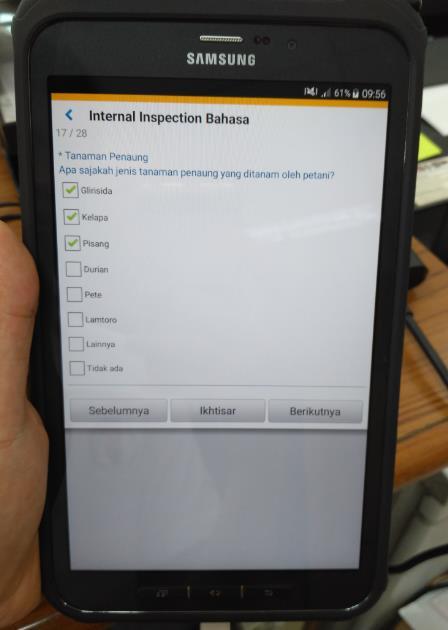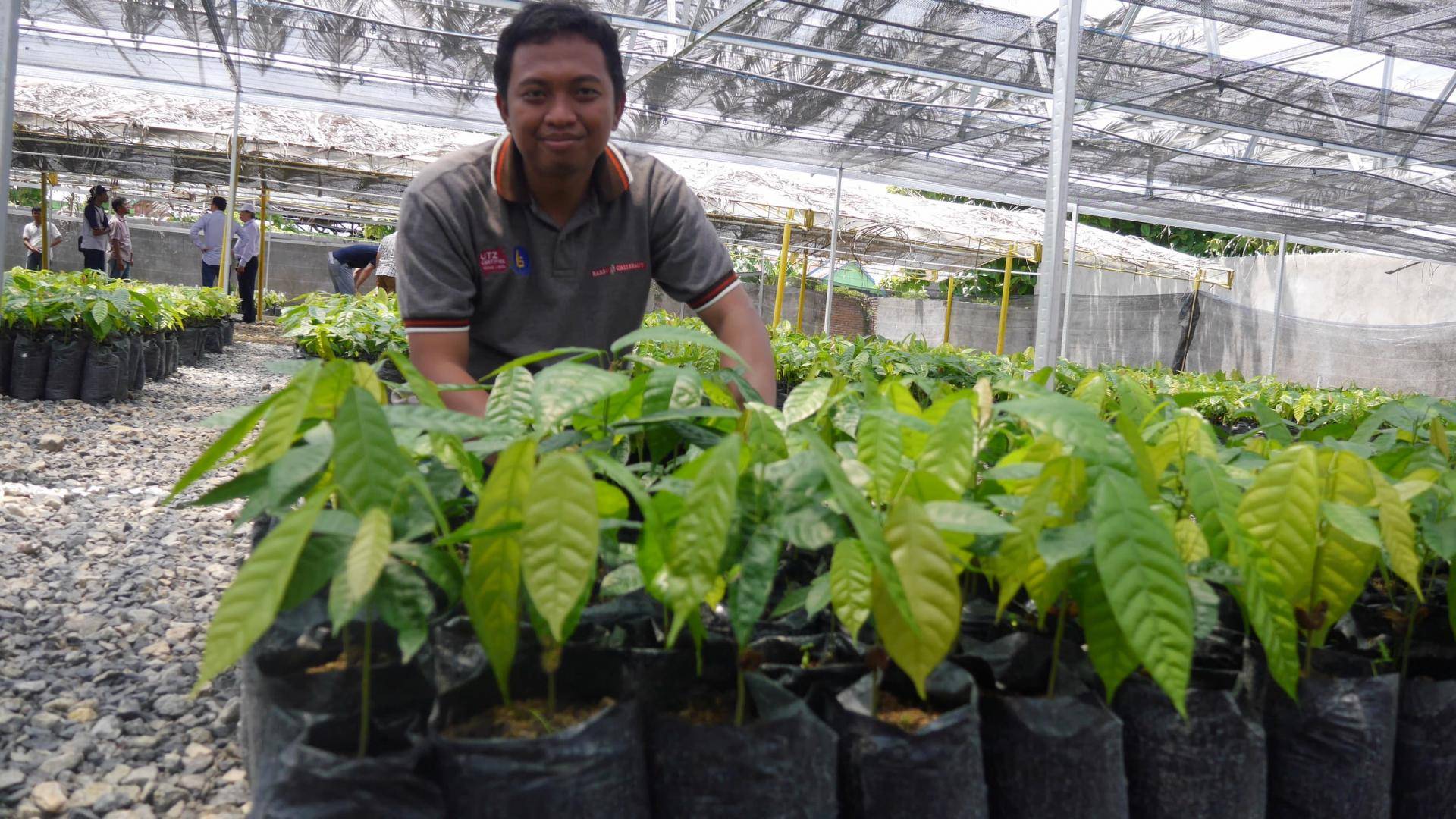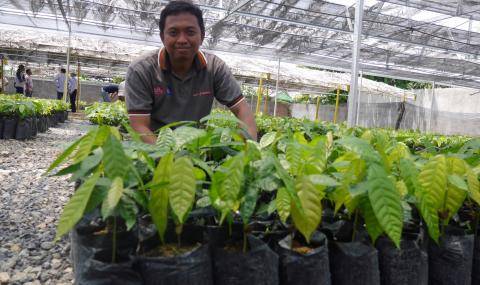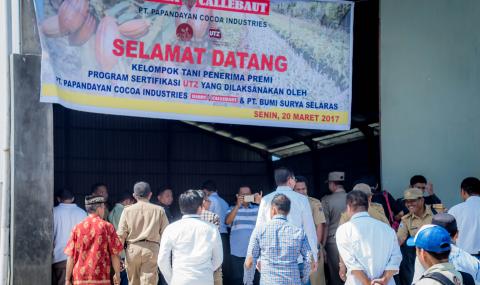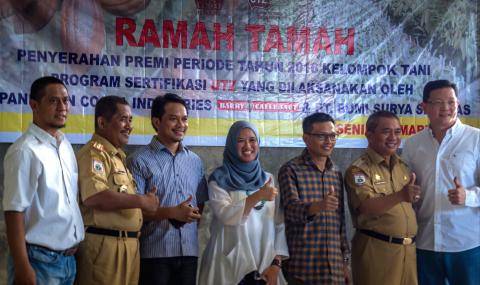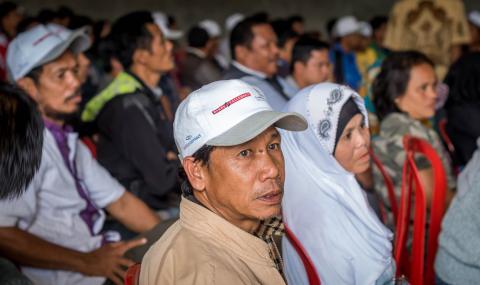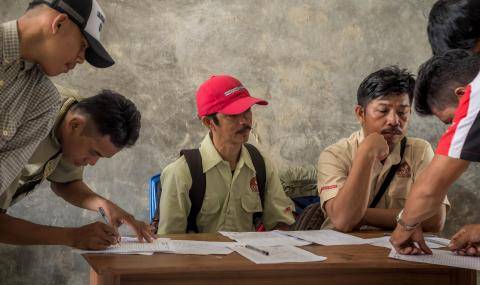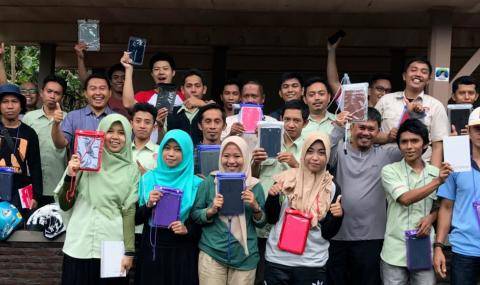Innovations and best practices key to helping farmers’ livelihood in Indonesia
Innovations and best practices key to helping farmers’ livelihood in Indonesia
Umar, an agronomist born in Sulawesi, has been there from the start. Since 2013, he has worked with hundred other field facilitators and trainers employed by Barry Callebaut in Indonesia to improve the agricultural practices of cocoa farmers. His hope is for more smallholder cocoa farmers in Indonesia to prosper by being more productive.
Cocoa farming is the principal income for an estimated 1 million Indonesian families; 500,000 of are in Sulawesi producing 60% of all Indonesia's cocoa. While there is no reliable data on the number of cocoa farmers living under the national poverty line, the rural populations of Indonesia - many of whom are farmers - are relatively poorer than the urban ones. In 2016, the Indonesian government defined the poverty line at a monthly per capita income of IDR 354,386 (approx. USD $26.6).
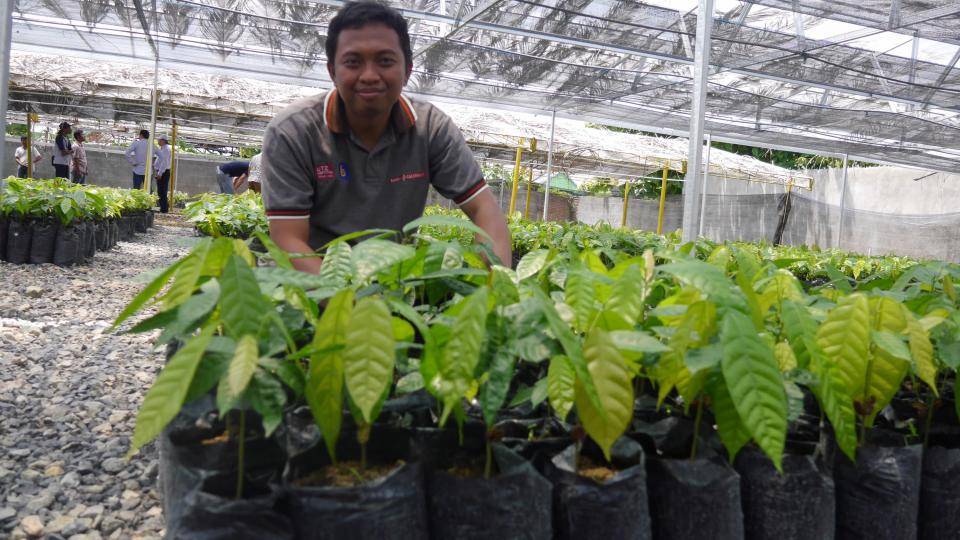
One of Umar's key task: Overseeing the implementation of the UTZ program
Umar works with other field employees in the sustainability team to reach out to cocoa farmer communities in different parts of Indonesia. The field team is young and diverse - many of them are in their 30s, with some coming from families who have cocoa farms or live around the farming communities. Many of the team members also hold a vocational or university degree; some in agriculture, biological sciences, sociology and even religious studies. More importantly, this enables the team to work together effectively to impart sustainable farming practices to the cocoa farmers, sometimes also helping to replace aging cocoa trees with cocoa seedlings and nurseries programs.
One of the key tasks for Umar and the field team is to oversee the implementation of the UTZ program, which supports the growing of sustainable cocoa. Barry Callebaut collaborates with various NGOs and confectionary producers through the UTZ program. The growing of certified cocoa is one of the most compelling tools that chocolate manufacturers use to improve the lives of cocoa farmers. Today, UTZ certified cocoa is produced in 19 countries including Indonesia, and is the largest program for sustainable farming of cocoa in the world.
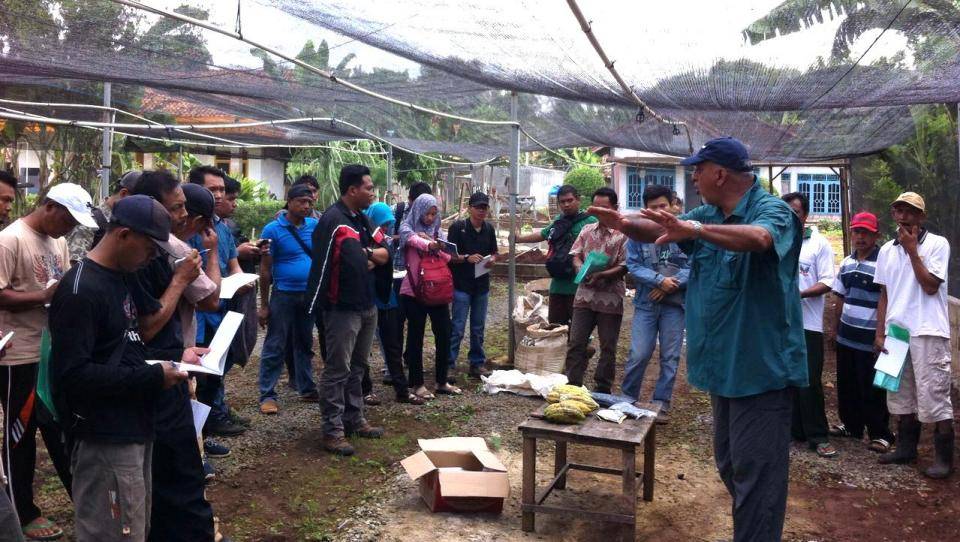
Better crops, more income while safeguarding the environment
Through the UTZ program, our field facilitators, who shuttle between different farmer communities, train farmers to grow better crops, generate more income and create better opportunities while safeguarding the environment and securing the earth’s natural resources.
Today, a growing number of certified farmers in Indonesia are better at these important practices: pruning and sanitation, pest and disease management, and fertilizer use. These farmers have improved storage, handling and disposal of agrochemicals, and are equipped with personal protective equipment.
An important contribution of the UTZ program is that certified cocoa farmers are paid more for their beans when they produce more quality beans. Through the UTZ program, the practices that the farmers adhere to produce a bigger amount of quality beans. Therefore, the higher the yield produced, the more the premiums the farmers receive.
Premium payments of USD 520,000 for around 18,000 farmers
Barry Callebaut’s collaboration under the UTZ program in 2015 saw 7,000 farmers from Polman and other cities in West Sulawesi gain more than USD 350,000 in premiums, in addition to their usual revenue.
Last year (2016), Barry Callebaut expanded its program reach to include other cocoa-growing areas in Sulawesi and South Sumatra. As a result, more farmers are in the program, with around 18,000 farmers recently receiving their premium payments for producing certified sustainable cocoa beans for Barry Callebaut. A total premium of USD 520,000 was handed out at the celebratory event attended by these farmers and local government officials. Most of the premiums are paid directly to the certified farmers, while the remainder is invested in projects to boost productivity, develop farms, and benefit the farmer community.
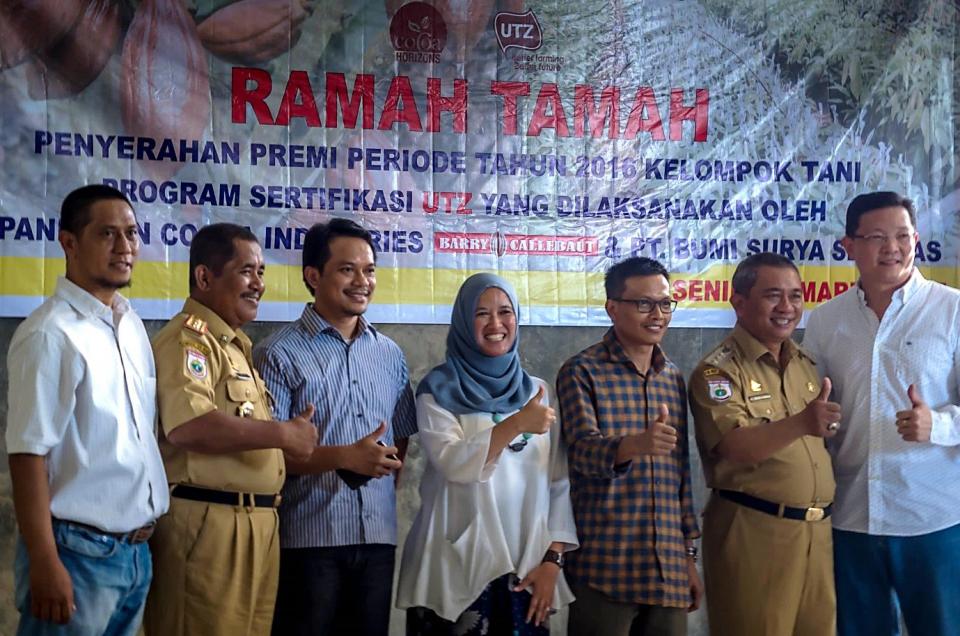
In order to achieve greater success with our sustainability efforts, we need to constantly improve our growing techniques and feedback processes, using better tools to meet the farmers’ needs.
Roll-out of cloud-based mobile app Katchilé in Indonesia to support local cocoa farmers
Over the course of the cocoa season, these farmers have acquired better agricultural, environmental and social knowledge and practices for growing cocoa. This not only improves their yield, but also their productivity and quality. Therefore, the effects of growing sustainable cocoa are compounded – farmers increase their incomes, hence improving their structural advantage for practices that result in cocoa beans of higher worth.
Recognizing the importance of continuous improvement, Umar projects that, “In order to achieve greater success with our sustainability efforts, we need to constantly improve our growing techniques and feedback processes, using better tools to meet the farmers’ needs.”
Until now, the data from remote smallholder farms has either been completely inaccessible or has required manual collection and collation by the field facilitators. Now with Katchilè, information including agricultural practices, production inputs, finances, yields and GPS data, is recorded and analyzed centrally.
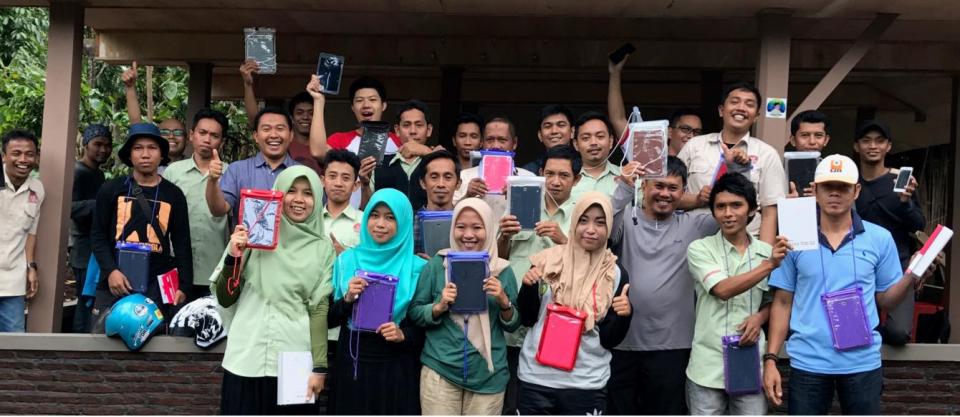
The mobile app Katchilè was developed in collaboration with SAP and was first introduced by Barry Callebaut in Côte d’Ivoire. It is now being rolled out in Indonesia to help improve data collection and farmers’ internal inspection. The 2nd phase of the launch will include the traceability process and provide field facilitators with the ability to tailor agriculture advice down to individual farm management plans.
Enabling traceability from the farmer to Barry Callebaut's warehouse
The solution combines desktop and mobile access, allowing usage in the most remote of locations. Since some cocoa farms in Indonesia are without stable mobile coverage, the app is designed to allow the field facilitator to collect data offline until it can access a network. The Katchilè app uses a cloud-based system that works independently of internet access. This allows real-time updates from the different farmers that work with Barry Callebaut to reach field facilitators and coordinators like Umar.
Information on farmers, their farms and their communities can be recorded digitally at every level of the supply chain. When the implementation is complete, farmer registration, cocoa buying, processing and transportation records will enable the traceability of cocoa beans from the farmer to Barry Callebaut’s warehouse.
Additionally, sustainability-related activity records allow for assessment of individual farmer and community needs and analysis, resulting in higher quality and higher impact support. Beyond the usual services, these farmers will have improved access to seedlings, fertilizers and training that cater to their specific needs. This approach is at the foundation of Barry Callebaut’s strategy to monitor and foster the adoption of sustainable cocoa and social practices and enhance impact on the ground.
Currently, Katchilè is being implemented as Pilot Project in Bantaeng and Lampung in Indonesia, where a growing number of farmers are enrolled in the UTZ certified programs with Barry Callebaut.
Reliable and timely data to better support the cocoa farmers
One month into going live, Umar notes that the field staff are still familiarizing themselves to using the new system of entering data. Yet, signs of better data reliability and integrity have started to surface. The app is also gradually capturing, consolidating and storing bigger volumes of data like relevant farmer information and their current agricultural practices. Working with more reliable and timely data is an important step forward for field facilitators to provide better support to the cocoa farmers.
Umar hopes that with the timely and relevant use of technology, cocoa farmers in Indonesia will be able to increase the productivity and value of their crops, hence improving their livelihoods. His ambitions strike a common chord with that of Barry Callebaut’s - Barry Callebaut aims to train more than 50,000 farmers in Indonesia on good agricultural practices by 2020. This is coupled with a global ambition called Forever Chocolate, which targets to lift more than half a million cocoa farmers out of poverty by 2025. With these efforts, we and Indonesian cocoa farmers alike can look forward to Barry Callebaut’s continued sustainability efforts in the nation.
